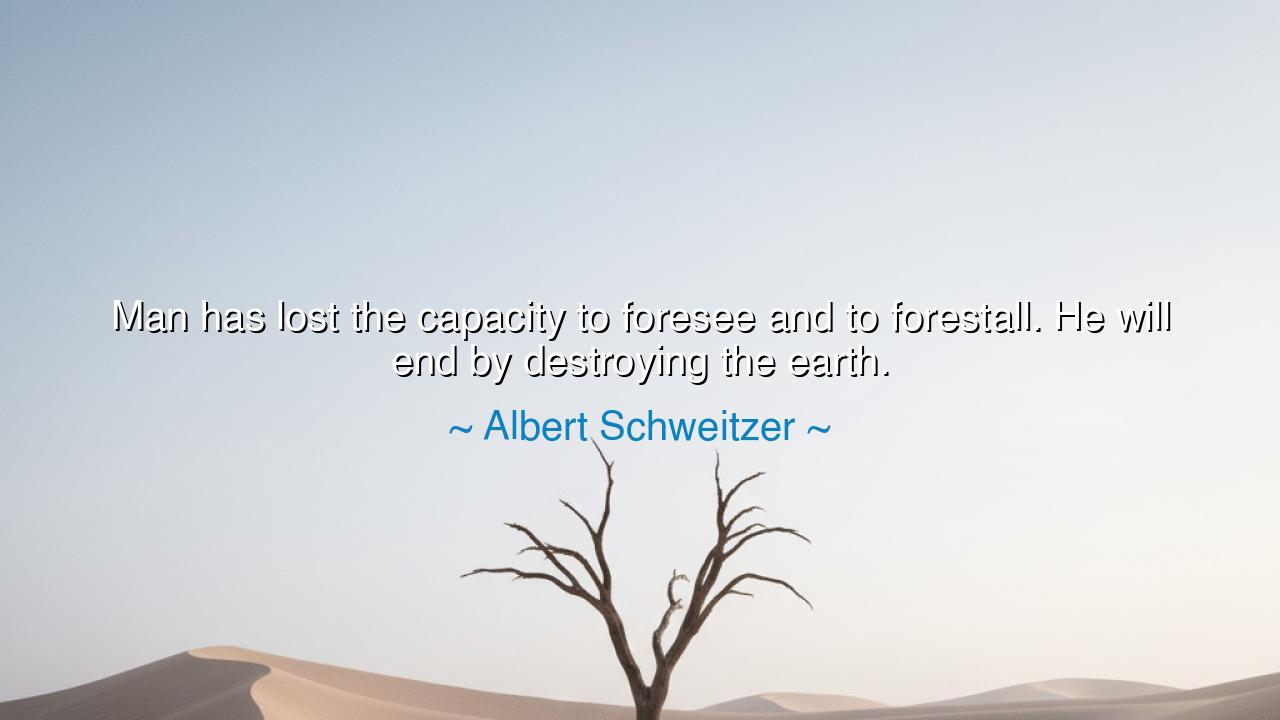
Man has lost the capacity to foresee and to forestall. He will
Man has lost the capacity to foresee and to forestall. He will end by destroying the earth.






Albert Schweitzer, the physician, philosopher, and man of reverence for all life, once warned with prophetic clarity: “Man has lost the capacity to foresee and to forestall. He will end by destroying the earth.” These words ring like thunder across the centuries, a cry of lament for humanity’s blindness and a summons to awaken before it is too late. For Schweitzer saw that while man had gained power over nature, he had lost the wisdom to guide that power. The tools of creation had become tools of destruction, and the capacity to look ahead, to restrain, to protect, had withered in the pursuit of greed and dominion.
The origin of this declaration lies in Schweitzer’s philosophy of “Reverence for Life.” Living through the devastations of two world wars and witnessing the reckless exploitation of nature, he understood that the greatest danger to humanity was not poverty nor famine nor even violence, but the loss of foresight—the inability to see the consequences of our actions. To foresee is to imagine the fruit of the seed before it is planted; to forestall is to act before destruction comes. Without these, he declared, mankind was like a blind giant, mighty in strength, but stumbling toward his own ruin.
The ancients, too, understood this truth. In Greek tragedy, the fatal flaw was often hubris—arrogance that refused to foresee disaster, though warnings were given. Think of Oedipus, who was told his fate yet pressed blindly toward it, bringing ruin upon himself and his city. So too is modern man: warned by prophets, scientists, and sages, yet pressing on in arrogance, consuming the forests, poisoning the waters, blackening the skies. Schweitzer’s words are but a modern echo of this eternal lesson: blindness to the future leads to self-destruction.
History gives us vivid examples. Consider Easter Island, where once a flourishing people cut down their last tree. They had built monuments to their gods and rivaled one another in glory, but they failed to foresee the barren desert they were creating. With the forests gone, soil eroded, food dwindled, and their civilization collapsed into ruin. What happened on a small island is but a shadow of what Schweitzer feared for the whole earth—that humanity, in its pride, would destroy the very foundation of its own life.
The meaning of his words is both dire and instructive. He does not say that destruction is inevitable, but that without foresight and restraint, it will surely come. The tragedy is not only in what man does, but in what man refuses to imagine. He clings to the present, to profit and power, and forgets that every act sows seeds into the soil of tomorrow. To forget the future is to betray one’s children; to scorn foresight is to scorn life itself.
The lesson, then, is clear: cultivate the capacity to foresee and to forestall. Train the eye of the spirit to look beyond today. Ask before every action: What will this mean for those who come after me? What fruit will this seed bear in ten years, in a hundred? And when destruction is glimpsed on the horizon, do not delay—forestall it, act swiftly, prevent the ruin before it grows. For wisdom is not only knowledge of the future, but courage in the present.
Practically, this means caring for the earth as a sacred trust. Plant trees rather than cut them recklessly. Protect rivers rather than poison them. Use the powers of science not only to advance comfort but to guard creation. In daily life, choose simplicity over excess, stewardship over exploitation. For every act of care is a bulwark against destruction, every act of reverence a step toward harmony.
Thus Schweitzer’s words endure as both warning and commandment: “Man has lost the capacity to foresee and to forestall. He will end by destroying the earth.” Let us take them into our hearts, not as despair but as a trumpet call. Let us recover foresight, let us learn to forestall, and let us turn from destruction to reverence. For only then will man walk not as a blind giant, but as a wise steward, preserving the earth that gave him life, so that life may continue for generations yet unborn.






AAdministratorAdministrator
Welcome, honored guests. Please leave a comment, we will respond soon